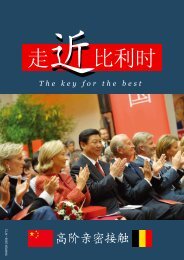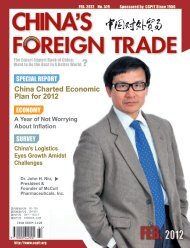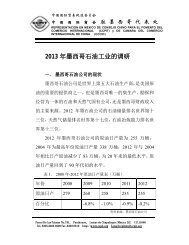Create successful ePaper yourself
Turn your PDF publications into a flip-book with our unique Google optimized e-Paper software.
Table 1 The Number of Europeans Coming to<br />
China (ten thousand), 2010-2011<br />
Table 2 Major Festivals in Europe<br />
Time Britain France Germany Total<br />
201001 4.21 3.59 4.49 12.29<br />
201002 3.53 3.05 3.42 10<br />
201003 5.55 4.03 5.96 15.54<br />
201004 5.03 4.44 4.93 14.4<br />
201005 4.99 4.96 5.79 15.74<br />
201006 4.38 4.04 4.71 13.13<br />
201007 4.94 5.09 4.73 14.76<br />
201008 4.85 5.14 5.44 15.43<br />
201009 5.14 4.39 5.39 14.92<br />
201010 6.18 5.75 6.81 18.74<br />
201011 5.1 3.64 5.22 13.96<br />
201012 3.61 3.16 3.98 10.75<br />
201101 4.37 3.61 4.81 12.79<br />
201102 3.86 3.42 4.34 11.62<br />
201103 5.32 3.93 5.21 14.46<br />
201104 5.88 4.82 5.89 16.59<br />
201105 5.12 4.42 5.77 15.31<br />
201106 4.45 3.64 4.61 12.7<br />
201107 5.08 4.57 5.13 14.78<br />
201108 4.97 4.73 5.78 15.48<br />
201109 5.12 3.91 5.51 14.54<br />
201110 6.2 5.19 7.01 18.4<br />
201111 5.11 3.71 5.49 14.31<br />
201112 4.08 3.37 4.15 11.6<br />
Data Source: National Tourism Administration of the People’s<br />
Republic of China.<br />
Figure 2: The Number of Europeans Traveling to<br />
China (ten thousand) (Jan 1, 2010-Dec 12, 2011)<br />
20<br />
18<br />
16<br />
14<br />
12<br />
10<br />
8<br />
6<br />
4<br />
2<br />
0<br />
Festival<br />
Date<br />
New Year's Day January 1<br />
Easter<br />
Labor Day (May 1) May 1<br />
Ascension Day<br />
Pentecost<br />
Variable (March / April)<br />
Variable (May)<br />
Feast of the Assumption August 15<br />
Variable (May / June)<br />
Halloween November 1<br />
Christmas December 25<br />
Boxing Day<br />
St. Stephen Day<br />
The British travel to<br />
China 2010<br />
The British travel to<br />
China 2011<br />
The French travel to<br />
China 2010<br />
The French travel to<br />
China 2011<br />
German travel to<br />
China 2010<br />
Germay travel to<br />
China 2011<br />
Europeans travel to<br />
China 2010<br />
1 2 3 4 5 6 7 8 9 10 11 12<br />
Europeans travel to<br />
China 2011<br />
Data Source: National Tourism Administration of the People’s Republic of China<br />
December 26<br />
In February, the number of Europeans coming to China<br />
went to the lowest. There are two reasons, on the one hand, the<br />
Chinese Spring Festival is in February, and on the other hand<br />
there are some influential festivals in February in Europe, such<br />
as the Venice Carnival and Munich’s Oktoberfest, which may<br />
attract a large number of Europeans.<br />
From February to April, it’s a good period to come to<br />
China, so there are usually a lot of Europeans traveling to<br />
China. However, there is a decline in May, which is caused by<br />
the local festivals of Europe in May and June.<br />
From June to August, the number of tourists will rise,<br />
and in September the number decreases. The reason is that<br />
most of Europeans usually have holidays in July and August,<br />
and return to work in September.<br />
The number of tourists will reach a new peak in October<br />
each year, and there is a sharp decline in November and December.<br />
This is because it is near Christmas, the most important<br />
festival in Europe.<br />
Clearly, the time position and duration of holidays are<br />
very important considerations when people arrange their travels,<br />
particularly overseas trips.<br />
Dependent factors of the holiday<br />
impact<br />
Holidays have impact on China-EU<br />
trade in goods and services, but the impact<br />
is significantly constrained by many factors.<br />
If some holidays are concentrated<br />
in one month, the impact of the holidays<br />
would be super imposed.<br />
According to Figure 1, in January<br />
2012, the China-EU trade dropped significantly<br />
compared with the same period<br />
last year because the Spring Festival<br />
and New Year’s Day were concentrated<br />
in January, leading to only 17 working<br />
days in January, 4 days less than a usual<br />
month. So the decline is very obvious in<br />
2012.<br />
21

















